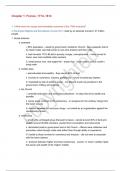Chapter 1: France, 1774–1814
1.1 What were the causes and immediate outcomes of the 1789 revolution?
a The Ancien Regime and the policies of Louis XVI = ruled by an absolute monarch; 27 million
people
1 Social divisions
a. peasants
i 80% population – taxed by government, landlords, Church - poor peasants had to
do repair roads, pay high prices to use wine presses and flour mills
ii bad harvests 1770–89 led to poverty, hunger, unemployment – many moved to
towns, poor and unskilled urban workers
iii bread prices rose, real wages fell – bread riots - urban unrest; police couldn’t
bring order
b. middle class
i well educated and wealthy - they owned 20% of land
ii involved in commerce, industry, professions - future revolutionary leaders
iii frustrated by lack of political power - not allowed to join top positions in the
government, military and judiciary
c. the Church
i controlled education and censored publications - to keep hold of its wealth and
benefits
ii senior posts confined to the aristocracy - no progress for the ordinary clergy from
the lower classes
iii division between rich and poor clergy - not united as an organisation against the
revolutionary forces
d. aristocracy
i small, elite, privileged group that paid no taxes - owned around 30% of land and
wealth, around 30,000 members, exempt from conscription and road works
ii dominated posts in government and in the Church - officers were noblemen and
promotion came through noble rank rather than through ability or experience
iii hostile to those involved in commerce and industry – did not want to associate
with the lower classes
iv divisions between higher and lower aristocracy - ‘poorer’ or ‘lower’ nobility, hated
the power and wealth of the ‘higher’ nobility
, 2 Louis XVI
a. absolute monarch – inherited the position and wanted to increase his power
b. young and inexperienced, weak and indecisive - had a great sense of duty and many
good intentions of ruling well
c. divisions within parlements - divisions at court and within the aristocracy and clergy =
made France a very hard country to rule
b Pressures for change
1 The Enlightenment
a. intellectual and philosophical movement - a major influence on the whole revolutionary
process in France
b. the writers challenged established ideas, institutions and social structures
2 Examples
a. Voltaire – critical of Church influence, unfair legal and judicial system
b. Montesquieu – critical of despotism and autocratic power; argued for an elected
parliament with system of checks and balances
c. Diderot – critical and questioning attitude to everything; argued for independent thinking
d. Rousseau – argued for more education and greater liberty; argued for authority and
freedom for men in the society
e. Quesnay – argued for greater freedom of trade and free production
c Reaction of Louis XVI to attempts at reform
1 Political and economic factors
a. 1777, Turgot replaced as finance minister by Necker – argued that more wars will make
France bankrupt but he was ignored
b. declaration of war against Britain 1778 – led to borrowing at high interest rates
c. Necker’s 1781 report hid France’s financial problems – also hid the huge cost of the war
with Britain
d. 1783 – war with Britain ended – France gained nothing = deeper national debt
e. Charles de Calonne appointed finance minister 1783 – proposed changes, such as
taxing the wealthy, in 1786; encouraging commerce and industry; creating confidence in
France so it can borrow more money
f. Assembly of Notables - summoned to gain support for the proposals; dismissed by the
King = the start of the financial and political crisis = led to revolution
2 Beginnings of widespread revolt
a. Parlement of Paris refused to support tax increases – as the royal accounts were not
accurate





